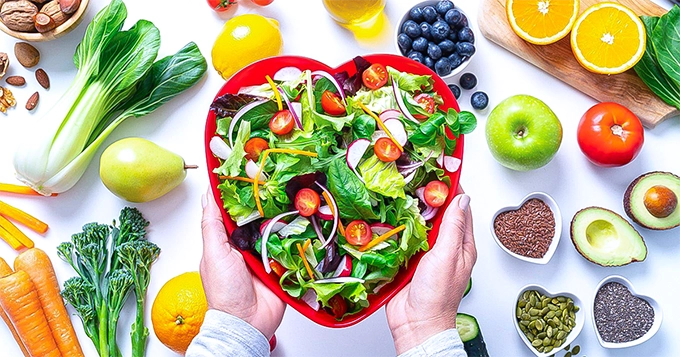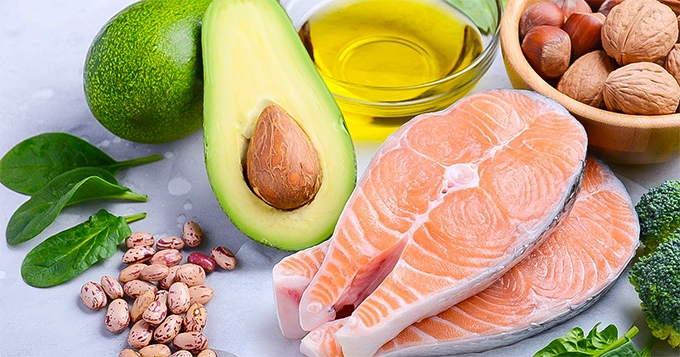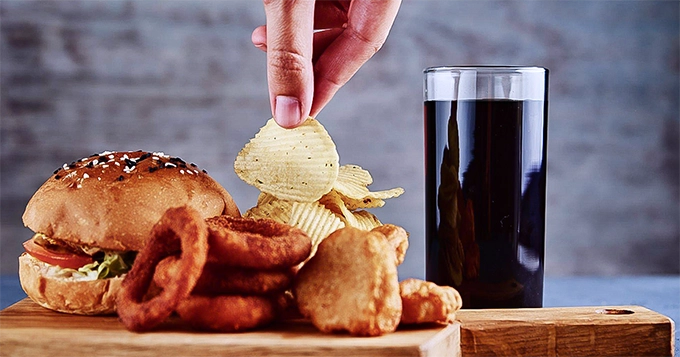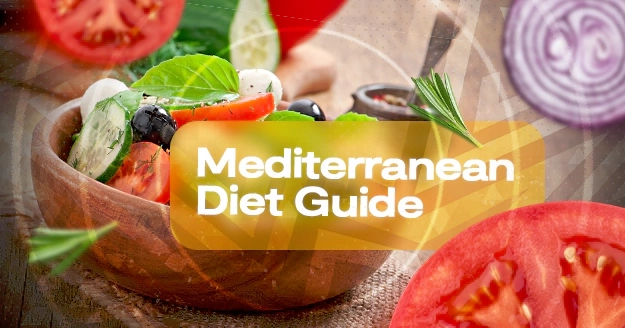What is the Mediterranean Diet?
The Mediterranean Diet is a plant-based traditional diet eaten in Mediterranean countries, including Greece, Spain, and Italy.
It is filled with delicious, high-quality foods that make eating enjoyable and satisfying. This diet contains a wide range of delicious and healthy foods, such as whole grains, legumes, olive oil, fruits, vegetables, and more.
Read our guide to the Mediterranean diet to learn the basics of eating well and feeling healthier.
Mediterranean Diet Health Benefits
Compared to numerous well-known diets, the Mediterranean diet is one of the most studied and research-backed dietary plans, with ample evidence of mitigating diseases and offering an array of health benefits.
Mediterranean Diet has shown that it may provide the following health benefits:
- Lower the risk of chronic diseases such as heart disease, diabetes, and certain cancers
- Decrease the risk of high cholesterol, metabolic syndrome, and high blood pressure
- Better insulin and blood sugar levels
- Lessen inflammation
- Assist in weight loss
- Lower risk of frailty and improve both mental and physical health
- Improve longevity
Mediterranean Diet Food List
Want to change your eating habits to be more like the Mediterranean style? Making sure you have a pantry and food list for the Mediterranean diet is an effective step to start. You can create limitless combinations of quick, simple, and healthful Mediterranean meals using the foods listed below if you have the basic ingredients.
Here’s what to eat when you’re making your meals more Mediterranean:
Vegetables
Vegetables are a rich provider of essential minerals and vitamins for the human body to function properly.
- Spinach
- Carrots
- Asparagus
- Broccoli
- Mushrooms
- Kale
- Artichokes
- Zucchini
- Cucumbers
- Onions
- Tomatoes
- Eggplant
- Potatoes
Fruits
A Mediterranean diet food list isn’t complete without fruits. Fruits are a great foundation of fiber, vitamins, and antioxidants.
- Pears
- Apples
- Lemon
- Melons
- Peaches
- Cherries
- Apricots
- Berries
Whole Grains
Grains are high in fiber, vitamins B5, and minerals. Use whole grain goods as often as you can because they have been proven to help in weight management and lower the risk of heart disease.
- Buckwheat
- Whole wheat
- Rye
- Brown rice
- Whole oats
Nuts and Seeds
Nuts and seeds are high in omega-3 fatty acids, protein, and fiber. They have an important role in the Mediterranean diet. The following are some of the most popular nuts and seeds you may include in your Mediterranean food:
- Almonds
- Pine Nuts
- Walnuts
- Almonds
- Chestnuts
- Pumpkin Seeds
- Sunflower Seeds
Beans and Legumes
Beans and legumes offer various nutritional benefits such as high fiber, protein, B vitamins, iron, and antioxidants. They can be used in numerous recipes and are also highly affordable.
- Beans
- Pulses
- Peanuts
- Chickpeas
- Lentils
- Split Peas.
Fish and Seafood
Lean protein is easily obtained from fish. Oily fish, such as wild salmon, are high in Omega 3.
- Salmon
- Sardines
- Mackerel
- Scallops
- Mussels
- Clams
- Tuna
- Shrimp
Healthy Fats, Oils, and Vinegar
Our major fat in Mediterranean cookery is high-quality extra virgin olive oil. To see if the extra virgin olive oil is good quality, drink a teaspoon of it and wait 10 seconds. It should cause a peppery burn in the back of your throat, indicating that it is anti-inflammatory.
- Olives
- Extra Virgin olive oil
- Avocado oil
- Red Wine Vinegar (in moderation)
- Balsamic Vinegar
Herbs and Spices
Herbs and spices are a great means to flavor food without adding extra calories. They are also high in antioxidants and other nutrition-promoting substances.
- Oregano
- Mint
- Garlic
- Cinnamon
- Pepper
- Paprika
- Parsley
- Basil
- Thyme
- Rosemary
- Bay Leaves
Drinks
- Water
- Unsweetened Tea
- Coffee
- Red wine (in moderation)
The following foods can be eaten in moderation, possibly twice a week:
- Poultry: Chicken, turkey, duck
- Dairy: Cheese, plain Greek yogurt, milk
- Eggs:
Foods that are Not Allowed in Mediterranean Diet
The Mediterranean diet restricts the consumption of most processed and packaged foods. The fewer the list of ingredients on a food label, the better. Foods in the following categories should be avoided:
- Processed Meats: Hot dogs, chicken nuggets, bacon
- Refined Grains: White bread, refined pasta, pastries
- Sweetened Foods: Ice cream, jelly, candy, juices, sodas
- Refined Oils and Trans Fats: Canola oil, soybean oil, butter, margarine
- Artificial Sweeteners
Tips for a Successful Mediterranean Diet
How can you incorporate these nutritious foods into your daily eating habits? Here are some minor steps you can take. Choose one change per week and gradually incorporate it. Begin with the changes you believe will be the simplest.
Here are five tips for implementing the Mediterranean diet to get you started:
- Cook food using extra virgin olive oil, but don’t overdo it, as it may lead to weight gain.
- Serve with whole-grain bread or other whole grains.
- Increase the variety of veggies on the menu.
- Eat at least three servings of legumes every week.
- Eat less meat, more lean poultry, and more fish.
- Avoid sugary beverages.
- Consume fewer high-fat, high-sugar desserts and eat more fresh fruits.
Recipes and Meal Ideas
Wondering what a typical day of eating a Mediterranean diet meal might look like? There are numerous ways to include the mouthwatering foods of the Mediterranean diet in your everyday meal.
To get you started, here are a few Mediterranean diet meal ideas:
Mediterranean Diet Breakfast:
- Coffee with a bowl of oatmeal topped with berries
- Smoothie made with your preferred milk, frozen cherries, banana, and cocoa powder
- Whole-grain bread topped with a slice of fresh tomato drizzled with a small amount of low-fat cheese with a little extra virgin olive oil
- Vegetable omelet made with spinach, onions, and mushrooms cooked in olive oil with crusty whole-grain bread
- If you are in a hurry but still want to eat a Mediterranean diet breakfast, grab yourself a greek yogurt topped with nuts and blueberries.
Mediterranean Diet Snack
- A handful of almonds or walnuts
- Roasted chickpeas
- Smashed avocado on whole-grain crackers
- Greek yogurt dip with fresh fruit and sliced veggies
- Dried cranberries and mixed nuts
Mediterranean Diet Lunch
- Tuna salad made with olive oil, olives, dried herbs, and sun-dried tomatoes served on a bed of spinach with mixed veggies and whole-grain crackers
- A cup of bean-based soup with a salmon salad sandwich
- Grilled mixed veggies over bulgar drizzle with olive oil and pumpkin seeds
- Chickpea and farro salad with red peppers, fresh oregano, and spring onions dressed with lemon juice and extra virgin olive oil
- Vegetarian pizza topped with part-skim mozzarella cheese, green peppers, onions, roasted broccoli, and carrots.
Mediterranean Diet Recipes Dinner
- Salmon with roasted zucchini and eggplant
- Garlic lemon chicken thighs served with asparagus and Israeli couscous
- Seafood stew, white fish, and shrimp in a tomato base
- Grilled shrimp, toasted quinoa salad, and mixed green salad with pine nuts
- Chicken stir-fried in olive oil with broccoli and asparagus, served over brown rice
Conclusion
The Mediterranean diet encourages a plant-based diet with an emphasis on consuming food in its whole, most natural form possible. It offers nutritional advantages like lowering your chances of cancer and cardiovascular disease.
If you want to begin your diet in the healthiest way possible, try the Mediterranean diet right away. Make real lifestyle changes to your dietary patterns rather than simply viewing new food options.









